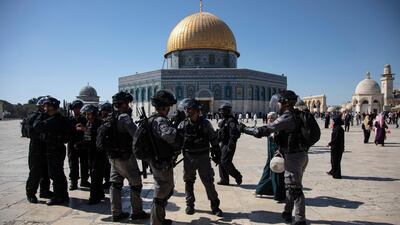As Muslims around the world celebrated Eid Al Adha, Palestinians worshippers at Al Aqsa mosque, one of Islam's holiest sites, were being shamefully brutalised by Israeli police. Shocking footage showed Israeli forces charging Palestinian protesters outside the Al Aqsa complex in Jerusalem's Old City and throwing sound grenades at unarmed worshippers. The demonstrators were protesting against Israel's last-minute decision to allow Jewish visitors into Al Aqsa during Eid, as the Muslim holy day coincided with the Jewish day of Tisha Bav this year. Christians and Jews are allowed to visit the complex but banned from entering the mosque. To avoid tensions, Israeli police had originally barred Jewish visitors from entering the site during the Islamic holiday to avoid tensions rising. But what was supposed to be a peaceful celebration turned to violence when Israeli authorities caved into the demands of far-right groups to open the site to Jewish visitors. Inevitably, clashes erupted and at least 14 injured Palestinians were taken to hospital.
Al Aqsa and the ancient Dome of the Rock form Haram Al Sharif, the third holiest Muslim site after Makkah and Medina. They are located in East Jerusalem, which Palestinians claim as a capital for their future state. Since the 1967 war, East Jerusalem has been under illegal Israeli occupation, placing the city and its emblematic Islamic monuments at the heart of a political struggle for Palestinian statehood and identity. Tensions over Al Aqsa reflect the fact that uneven forces are at play in this conflict. The site is supposed to be managed by Jordan on behalf of the Palestinians, yet access is routinely barred to Muslims and it is the Israelis who guard it. Clashes at the mosque complex have also become frequent in recent years. In 2017, violence erupted when Israeli forces installed metal detectors at the entrance to Al Aqsa in retaliation against an entire population for an attack on two policemen and the site was temporarily closed for Friday prayers.
Israel's latest provocation is a calculated move on the part of the Israeli far-right, just weeks ahead of parliamentary elections, to skew votes in their favour by politicising a site that should be sacrosanct. The complex is frequently used as a political tool to whip up fervour and antagonism. It was Ariel Sharon's visit to the site in 2000, during his campaign to become Israel's prime minister, that instigated the second intifada. The sanctity of such holy sites cannot be desecrated in this way to fulfil dubious political ends. Palestinians have a right to mark one of the holiest days of the Islamic calendar in their own homeland, as millions of Muslims also have the right to observe it as they have done on the same spot for centuries.

